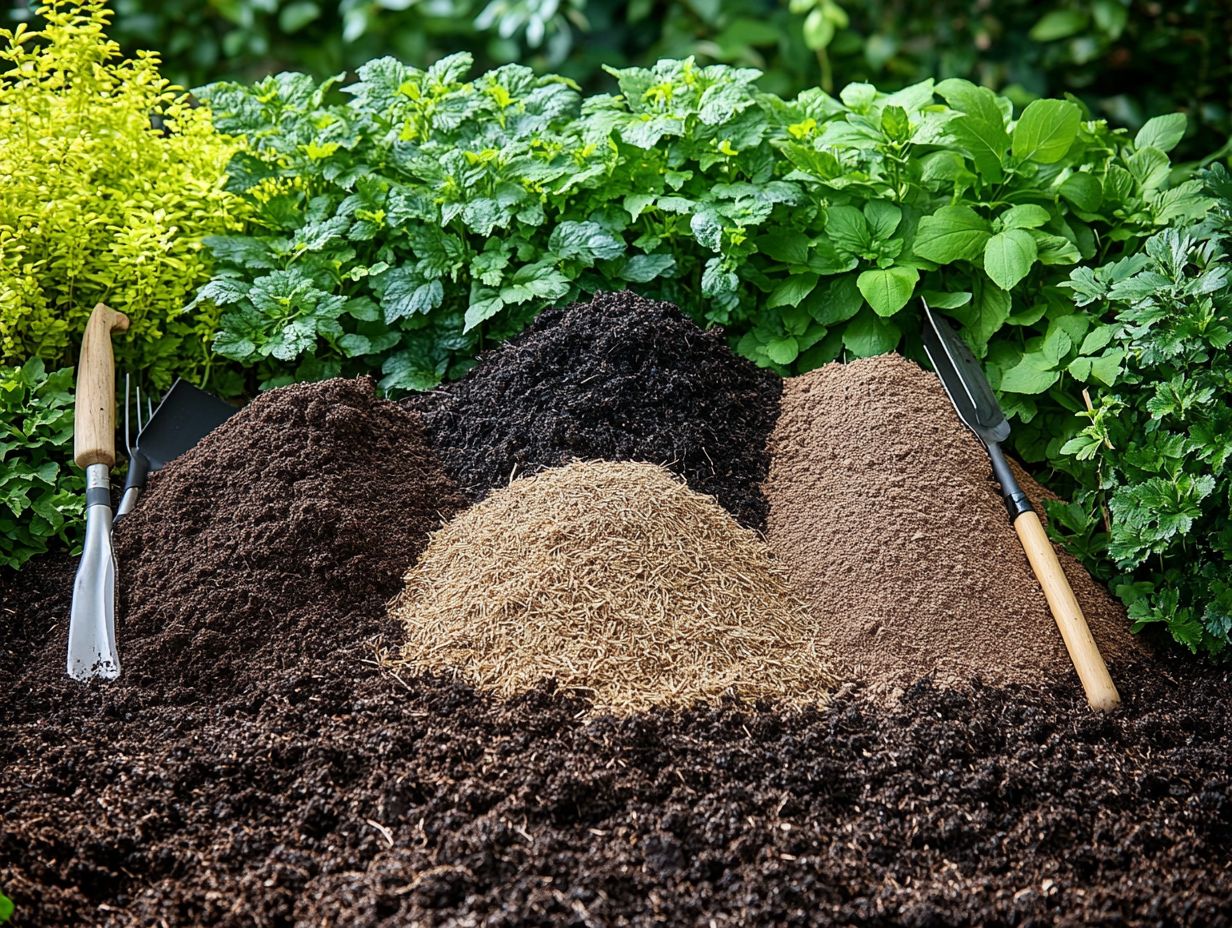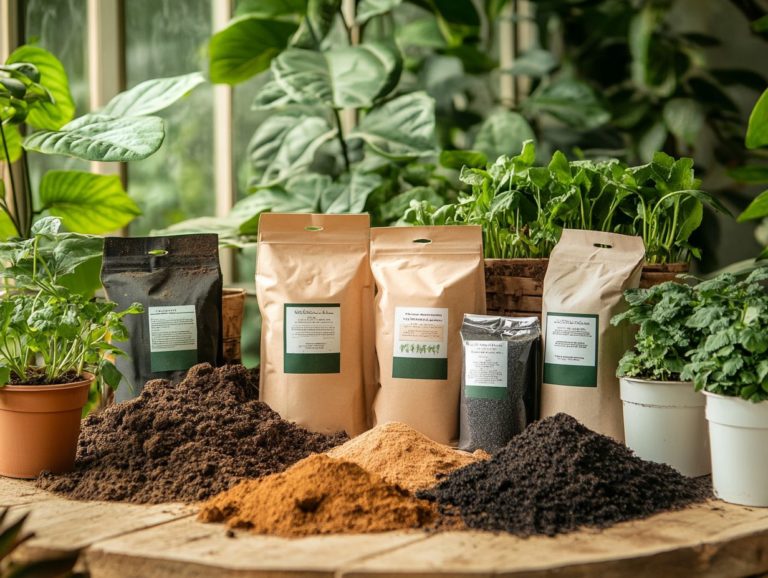Understanding Soil Amendments and Their Uses
Soil health serves as the cornerstone of thriving gardens and robust crops. Soil amendments are essential for anyone serious about gardening or farming, especially considering the key role of nutrients and the importance of testing soil quality.
You may wonder, what exactly are soil amendments, and how do they differ from fertilizers? This article aims to clarify these concepts while delving into the various types of amendments, including both organic and inorganic options, such as compost and vermiculite, to enhance soil texture and structure.
It explores many benefits these amendments provide for soil quality and plant growth. This guide will help you select the right amendment for your specific needs, such as improving water retention and nutrient availability, along with the best practices for their application.
Jump in now to discover how to supercharge your soil and create a thriving garden!
Contents
Key Takeaways:

- Soil amendments are materials added to soil to improve its quality and fertility, different from fertilizers which mainly provide nutrients.
- Organic and inorganic amendments have different uses and benefits, such as improving soil structure and nutrient availability. Consider factors like soil type and plant needs when choosing the right amendment.
- Proper application and timing of soil amendments can greatly benefit plant growth and overall soil health. Follow best practices for best results!
What are Soil Amendments?
Soil amendments are essential materials you incorporate into your soil to enhance its physical properties, boost nutrient availability, and elevate its overall quality. These factors play a pivotal role in promoting robust plant growth and health.
These amendments can span a spectrum, from organic options like compost to inorganic additives designed to adjust pH levels. They also improve moisture retention and refine soil structure. Additionally, using soil amendments for pest control through thoughtful selection and application is vital for cultivating a fertile environment where roots can flourish.
This is particularly important when dealing with diverse soil types, such as clay and sandy soils, ensuring that vital nutrients are efficiently delivered to your plants.
Defining and Differentiating from Fertilizers
Soil amendments and fertilizers each play vital roles in enhancing soil quality and promoting plant growth. Amendments focus on improving soil structure and nutrient content, such as compost and manure, while fertilizers like ammonium sulfate provide that immediate nutrient boost your plants crave.
Consider amendments like compost and peat moss; these enrich your soil with organic matter, enhancing its ability to retain moisture and nurture beneficial microbial activity. Over time, this also fosters healthier ecosystems that support robust plant roots and overall growth.
On the flip side, fertilizers such as ammonium nitrate and superphosphate deliver essential nutrients like nitrogen, phosphorus, and potassium exactly when your plants need them most. This facilitates quick growth spurts.
While both are essential in gardening and farming, understanding their distinct contributions allows you to adopt a more nuanced and effective approach to maintaining soil health and maximizing crop production.
Types of Soil Amendments
Soil amendments can be broadly classified into organic and inorganic types, with each serving a crucial role in enhancing the soil’s physical and chemical properties to foster healthier plant growth.
Organic amendments think compost, wood mulch, and vermiculite work wonders by enriching the soil with essential nutrients, improving moisture retention, and boosting the microbial community.
On the other hand, inorganic amendments, such as perlite and gypsum, are key players when it comes to adjusting soil structure and pH levels. They create the ideal conditions for a diverse array of plants to thrive.
Start improving your soil today and watch your garden flourish!
Organic vs. Inorganic Amendments

Organic amendments come from nature. Think compost and manure; they enhance soil health over time.
They infuse the soil with nutrients, improve its structure, and create a thriving ecosystem.
In contrast, inorganic amendments can provide that instant nutrient boost but might not deliver the long-term advantages you seek.
Striking this balance is essential for sustainable agriculture. Organic materials significantly enhance the soil’s moisture retention, which is critical during dry spells.
They nurture beneficial microorganisms that play a key role in the way nutrients move in the soil, ultimately resulting in healthier plants.
On the other hand, inorganic amendments shine when delivering essential nutrients like potassium and calcium swiftly, ensuring your crops receive the necessary support for rapid growth during demanding phases.
However, relying solely on these chemical solutions can lead to soil quality decline over time if not managed properly. This raises valid concerns about future soil fertility, highlighting the importance of balance for the health of your soil and crops.
Common Amendments and Their Uses
Common soil amendments encompass a range of materials, including compost, manure, worm castings, greensand, and rock phosphate. Each serves distinct purposes, elevating soil fertility and structure across various gardening applications.
These amendments do more than just enrich the soil; they foster healthier plant growth by providing essential nutrients. For example, compost boosts the humus content of your soil, enhancing moisture retention and promoting microbial activity.
Manure, with its rich nitrogen content, is perfect for giving a lift to heavy feeders. Worm castings act as a slow-release fertilizer that encourages robust root development.
Greensand, abundant in potassium, supports plants in tolerating stress, while rock phosphate offers a long-lasting phosphorus supply, vital for flowering and fruiting.
Integrating wood ash can help raise your soil’s pH, creating more alkaline conditions. Gypsum can refine soil structure, particularly in clay-heavy soils, by binding soil particles into aggregates, enhancing drainage and aeration.
Benefits of Using Soil Amendments
Using soil amendments can transform your gardening experience! You ll see improved soil quality, enhanced nutrient availability, and superior moisture retention, all contributing to an environment ripe for plant growth.
This creates a fertile setting that nurtures healthy root systems and robust plant development. By targeting specific soil issues, such as poor drainage or imbalanced pH levels, these amendments cultivate an ideal habitat for beneficial organisms like earthworms.
Their presence is vital for nutrient cycling and soil aeration, making your garden thrive like never before.
Improving Soil Quality and Plant Growth
Improving soil quality through the careful application of amendments profoundly impacts your plants’ growth by optimizing nutrient availability, enhancing soil structure, and boosting moisture retention essentials for robust plant development.
You have a variety of amendments at your disposal, each offering distinct benefits to achieve these objectives. Organic materials, such as compost, are particularly effective; they not only enrich the soil with vital nutrients but also enhance overall fertility while encouraging the diversity and activity of beneficial microbes.
This symbiotic relationship fosters improved nutrient cycling, ultimately benefiting plant health.
On the flip side, inorganic amendments like lime or sulfur can swiftly address immediate deficiencies in soil pH or nutrient levels, ensuring your plants receive the essential minerals they need for vigorous growth.
Combining these strategies creates a comprehensive approach to cultivating fertile soils that nurture thriving ecosystems.
How to Choose the Right Soil Amendment

Selecting the right soil amendment involves considering several key factors. First, assess your existing soil quality, the nutrient needs of your plants, the pH levels, and the moisture retention capabilities.
By evaluating your soil, you ensure the right amendment for your garden.
Factors to Consider
When choosing a soil amendment, consider the current soil pH, nutrient levels, moisture retention capabilities, and the specific needs of your plants.
Start by testing your soil’s pH. It should typically fall between 6.0 and 7.5 for good nutrient availability and healthier plant growth. Conduct a soil test to identify nutrient deficiencies, specifically nitrogen, phosphorus, and potassium. This information is invaluable for making informed choices, whether you need organic compost, lime for pH adjustment, or specific fertilizers.
Evaluating moisture retention is also crucial. If you have sandy soil, adding peat moss can improve water-holding capacity. On the other hand, if you’re dealing with clay soil, gypsum can enhance drainage. Aligning your amendments with your plants’ needs sets a strong foundation for a thriving garden.
Application of Soil Amendments
Using soil amendments effectively is key to unlocking their full potential. By mastering best practices and timing for application, you can significantly boost nutrient availability and promote robust plant growth.
Best Practices for Application and Timing
Employing best practices for applying soil amendments can enhance their effectiveness. Ensure nutrients are available to your plants when they need them.
To maximize the benefits, mix organic materials like compost or peat into your soil before planting. This allows microbes to break them down, delivering nutrients straight to the roots. This proactive approach lays a solid foundation for healthy growth.
During the growing season, top-dressing with fertilizers can elevate nutrient availability and promote moisture retention. For example, spreading mulch in late spring can keep your soil cool and damp, helping to prevent drought stress.
By strategically applying these methods, you create an optimal environment for healthy plant development.
Frequently Asked Questions

What are soil amendments and why are they important?
Soil amendments are materials added to soil to improve its physical, chemical, or biological properties. They help increase soil fertility, improve drainage, and create better growing conditions for plants, including adjusting pH levels.
What are some common types of soil amendments?
Common soil amendments include compost, manure, peat moss, and vermiculite. These materials add organic matter, improve water retention, and provide essential nutrients.
How do I know which soil amendment to use?
Your choice of soil amendment depends on your soil’s condition and your plants needs. A soil test helps identify missing nutrients and guides you in selecting the right amendment.
When should soil amendments be applied?
You can apply soil amendments anytime, but doing so before planting or during the off-season is best. This timing helps the amendments mix into the soil properly, promoting healthy growth.
Can I use too much soil amendment?
Using too much soil amendment can cause nutrient imbalances and harm plant growth. Stick to recommended rates and conduct soil tests regularly to maintain a proper nutrient balance.
Are there any organic alternatives to synthetic soil amendments?
Yes, organic alternatives to synthetic soil amendments include compost, manure, and bone meal. These options provide similar benefits without chemicals, supporting healthy roots.






